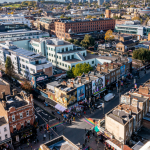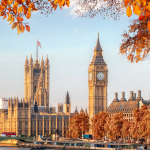As Leader of Westminster City Council, Adam Hug is unique in counting among his residents both the King and the Prime Minister. The local authority’s boundaries sweep in the West End, a string of Royal Parks, and the seat of Government. It also includes all but a handful of the famous properties found on the Monopoly board.
Yet, alongside world-famous buildings, streets and squares, the area is also home to some of the UK’s worst pockets of deprivation. And it is this straddling of extremes which underpins Hug’s whole approach in the nearly two years since Labour took over running the council.
“We are elected by the residents of Westminster”, Cllr Hug tells me, and “they’re the people we want to ensure the fruits of the Westminster economy are spread [wide] for all to benefit”. To achieve this, Hug is clear the partnership with the private sector is key. “We’ve been encouraged by the way all businesses have engaged with our fairer economy approach”, he says.
Central to the council’s fairness agenda is the partnership between business and local charity Young Westminster Foundation (YWF). The organisation supports young people growing up in the City and as announced last year, the WPA has fundraised £255,000 to help support its local employability scheme over three years. Hug talks passionately about widening opportunities for younger residents and creating pathways into sustainable employment and good jobs. “We want to ensure that the people going through [YWF’s programmes] end up in the boardrooms in 15-or-20 years’ time” and challenges business to “better reflect the environment they’re operating in”.
Alongside fairness, climate change is another key priority for the City Council. Westminster’s flagship policy is its Sustainable City Charter, developed in partnership with the WPA. Hug is pleased with the private sector’s positive engagement on tackling net zero, whilst acknowledging there’s a lot more still to be done. “We’re all heading in the same direction, but it’s just trying to find ways for everyone to mutually benefit.”
So far, 50 organisations are signed up to the Charter, covering five million square metres of the city’s floorspace. He’s happy with progress so far but is ambitious to aim even higher: “We’ve got to do more, and we’ve got to get more partners involved so that the partnership is meaningful, is sharing best practice and is helping us all along that journey towards net zero” he says, adding “we really appreciate the role of the WPA in helping corral business.”
With the decision by the Secretary of State Michael Gove to refuse permission for Marks and Spencer to demolish its flagship store on Oxford Street the issue of refurbishment versus demolition has shot up the agenda. “Our policy is retrofit first, not retrofit only”, Hug says, but he recognises “there will be understandable differences of opinion about where the balance should lie” and that the council has “been clear that if there is a carbon cost there must be a clear public benefit test about what it delivers for the city rather than just for the bottom line of a particular company”.
He’s keen to “encourage people to think through everything to do with retrofitting because if you do want to make the case for demolish and rebuild, a broader public benefit test is crucial to make that case”. The Council aims for its emerging policy framework to encourage a boom in commercial building refurbishment, upgrading the office stock for the needs of today’s occupiers and reducing greenhouse gas emissions at the same time. Cllr Hug acknowledges that the council is on a journey, trying to “strike a balance that’s right for the city and all of our stakeholders, our residents and our businesses”, but warns that it won’t be able to please everybody.
He’s keen to stress that the council has been in “listening mode”, and that the plan is to “come back with some revised proposals shortly”. Indeed, in the days after this interview took place, the fruits of this further deliberation were made public, as the council published updated policies on its carbon off-set payments for new development, where the cost for all-electric buildings – which now form the majority of major development schemes in Westminster – will be from discounted from the new rate of £880 per tonne to £330 per tonne.
Stewardship of the West End – on behalf of the local authority, and indeed both the capital and UK given its unique area – weighs heavy on Hug. “We recognise the importance of the CAZ (Central Activities Zone)”, he says, and points out the council has “spent a lot of time getting Oxford Street back on track so that we can have that fuel at the heart of the city, and we have similarly ambitious plans for Regent Street.”
He saves one of his few direct criticisms of the previous regime for its record on Oxford Street, referring to the “the disasters of the [Marble Arch] mound and the £35m spent [on the Oxford Street District] by the previous administration to not actually deliver anything of substance”.
While Oxford Street might be the nation’s high street, Hug is keen to champion its work on other high streets across Westminster. “I’m proud of the work we’re doing to reimagine the centres of local communities through our High Streets programme in Bayswater and Paddington”, also talking about the council’s “cross-cutting North Paddington project to tackle entrenched poverty in one of the most deprived parts of our city”. These approaches are now being rolled out elsewhere, including in Pimlico.
Similarly on homes, he focuses on the growing housing crisis facing the city. “We face a real crisis across London, including from the temporary housing pressures”, Hug says, and that “getting us building council homes is absolutely crucial”.
It’s fair to say that housing was one of the big factors in what has been an astonishing few years for area’s politics. In May 2022’s local elections, Labour captured the City Council for the very first time. Along with the Conservative loss of Wandsworth, these two totemic blue councils turning red sent political shockwaves far and wide.
Hug believes the signs of change were first seen at the time of the Brexit referendum, and that “some of the tectonic plates were shifting”, with the red encroaching further into blue territory through the 2017 and 2019 General Elections. Hug led Labour into the 2018 local elections, which he described as “hard fought” and while unsuccessful, argues that “we made ourselves much more competitive for 2022 and the rest, as they say, is history”.
His own personal story with Westminster stretches back to his student days. Hug was Chair of Labour Students in 2004/5 – the year Labour last won a General Election, and settled in the area shortly afterwards, becoming active pounding the streets for Westminster North MP Karen Buck in the 2010 General Election.
It was then that he decided to stand for local council. Reflecting, he adds that “the mission at that time was very much to be a champion for the people in the area that I was representing”. Alongside his responsibilities as a local councillor until his election as Council Leader, Hug ran an international thinktank – the Foreign Policy Centre – “from the global to the local”, he quips.
Fast forward, and now he runs a local authority – perhaps the most high-profile council in the whole country. And what a journey it has been – “I don’t think anyone would have envisaged I’d end up where I ended up”, he remarks.
Looking ahead, 2024 promises to be a year of elections. Londoners hit the polls in May to elect the Mayor, and a General Election looks likely later in the year. The Cities of London & Westminster constituency is a top target for Labour and the Lib Dems, and Keir Starmer will be hoping that 10 Downing Street, Buckingham Palace and Parliament soon have their very first Labour MP.
With polls currently pointing towards Sadiq Khan’s re-election and a Keir Starmer Government, what might this mean for a Labour-run City of Westminster? Hug lasers in on local government finance, wanting to see the “tanker turned round both financially and in terms of consistency of approach and long-term thinking”.
Devolution is a key ask of the councils. He mentions Labour’s proposed Take Back Control Bill as an opportunity “to rebalance some of the powers within the British state so that local government can do more and doesn’t constantly have to wait for Whitehall to sort things out”.
His hope is that the council could achieve much more with a Labour Mayor and Labour Government, but he’s not getting ahead of himself: “there’s a lot of hard campaigning ahead!”
This interview was conducted by London Communications Agency on behalf of the London Property Alliance as part of its curation of the monthly Central London newsletter.
Read more from our London Leaders series here.


